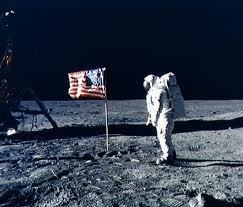The Space Crawl
 The Space Crawl
The Space Crawl
It sounds like a new kind of swimming stroke or perhaps a retro-dance from the sixties. Unfortunately, it's probably the most accurate way to describe the current state of the manned space program in the U.S.
The shuttle Atlantis' recent landing ended the space shuttle era. Now the U.S. finds itself with only one way to get its astronauts to the International Space Station: pay the Russians for a seat aboard a Soyuz capsule. At $51 to $67 million a person, it's one of the most expensive taxis in the universe. And what's more, only one American can go at a time, since the other two slots are for Russian Cosmonauts.
 I know a lot of folks out there wonder why someone who professes a "green bent" and is into "reduce, reuse and recycle" would mourn the end of the Space Race era. Yes, I admit I miss all the excitement of watching a Saturn V launch from Cape Canaveral and streak toward the moon. I miss the fuzzy video of astronauts walking and driving across the lunar landscape. I miss the sheer terror of the capsule splashdown at sea. But what I think I will miss the most is our loss of pride and obvious intelligence. The U.S. has let its manned space program essentially collapse under the weight of bureaucracy and politics, throwing thousands upon thousands of people who worked either directly and indirectly for NASA out of work.
I know a lot of folks out there wonder why someone who professes a "green bent" and is into "reduce, reuse and recycle" would mourn the end of the Space Race era. Yes, I admit I miss all the excitement of watching a Saturn V launch from Cape Canaveral and streak toward the moon. I miss the fuzzy video of astronauts walking and driving across the lunar landscape. I miss the sheer terror of the capsule splashdown at sea. But what I think I will miss the most is our loss of pride and obvious intelligence. The U.S. has let its manned space program essentially collapse under the weight of bureaucracy and politics, throwing thousands upon thousands of people who worked either directly and indirectly for NASA out of work.
How does putting thousands out of work, hamstringing our own manned space efforts, and losing all the momentum from the Space Race era help the current U.S. economy? Talk about not "reusing" and "recycling"! We're forcing professional rocket scientists, astronauts, and all their support personnel back into the workforce to compete with the rest of us for jobs at McDonald's and Wally-World.
All those wonderful inventions inspired by NASA like Tang and Velcro? Who cares! The Russians and Chinese will be creating—and marketing—all future tech inspired by space travel. The money and commerce this tech will generate will add a rosy glow to their economic futures. Too bad it won't be helping anyone in the good ol' U.S.A.
Who really needs to be innovative? Most Americans would probably say as long as they have their iPhone and reality TV shows they're perfectly happy to let others design and implement the world of tomorrow. They'll complain that their new playthings cost more--and that the instructions will be written in Russian or Chinese--but they'll adapt.
But all is not totally lost. In How to Build Your Own Spaceship by Piers Bizony, the author details which private enterprises are working on manned space transports and what sorts of future tech we'll be seeing in the next few decades. While he is cautiously optimistic, I can't help but think that, since these are private individuals and corporations creating the space tech, they won't be sharing the benefits of said tech freely with the public.
 And all those lovely photos taken in space that NASA gave away for nothing? We might have to pay to see the next coolest galaxy spied from a private spacecraft. We might have to sign up to a pay-on-demand channel to see the first fuzzy images from a private moonbase or trip to Mars. Sure, if you have a big chunk of change you too can fly on Richard Branson's Virgin Galactic shuttle, but how many of us will be able to afford it? We'll be working at McDonald's.
And all those lovely photos taken in space that NASA gave away for nothing? We might have to pay to see the next coolest galaxy spied from a private spacecraft. We might have to sign up to a pay-on-demand channel to see the first fuzzy images from a private moonbase or trip to Mars. Sure, if you have a big chunk of change you too can fly on Richard Branson's Virgin Galactic shuttle, but how many of us will be able to afford it? We'll be working at McDonald's.
One online article stated that while thousands of NASA astronauts, scientists and engineers were about to be thrown out of work by the end of the shuttle program, the bureaucrats at NASA held no fear—their jobs were simply going to be moved to another department.
Paper-pushers push out the innovators of technology that has helped us all live better lives... Uh-huh. I say let's recycle the paper-pushers and put the rocket scientists back to work. I'd rather my taxes go to support the creators of future space technology. I'd rather see the infinite stars than endless miles of red tape. Wouldn't you?
Published on July 27, 2011 15:08
No comments have been added yet.



